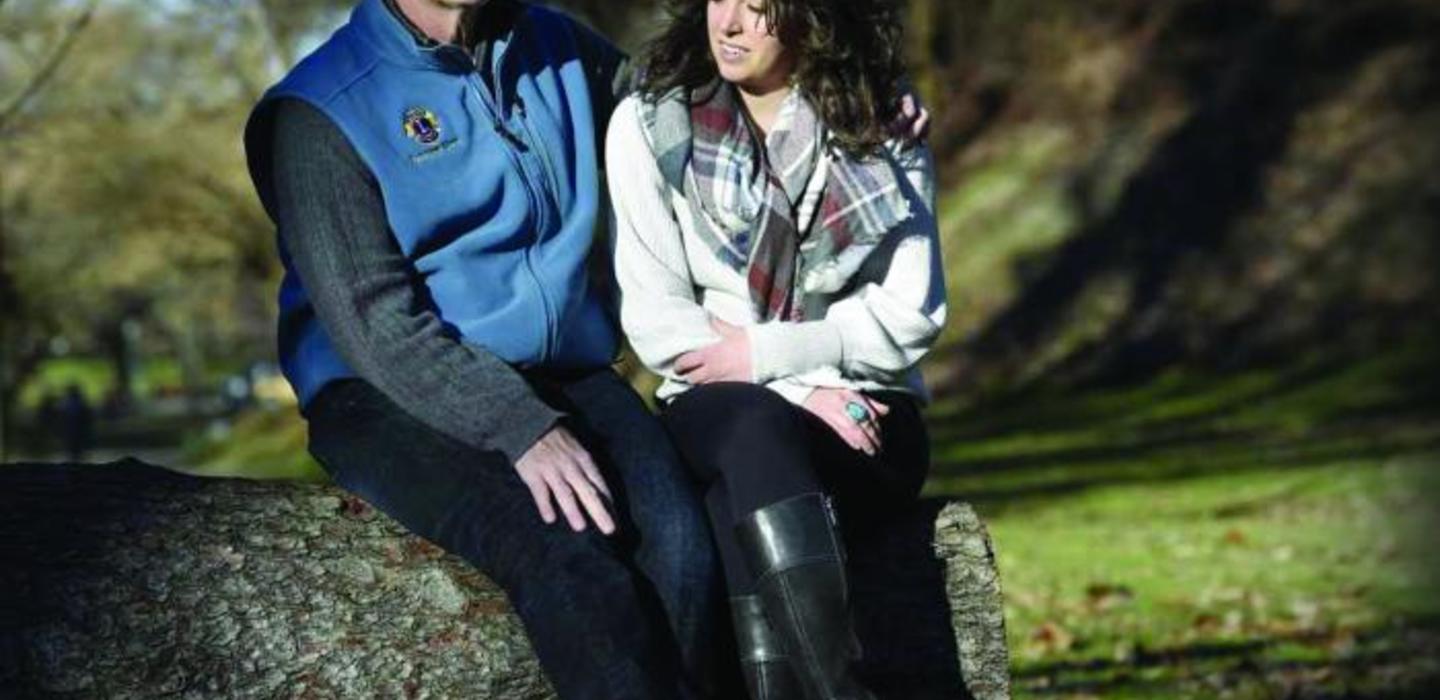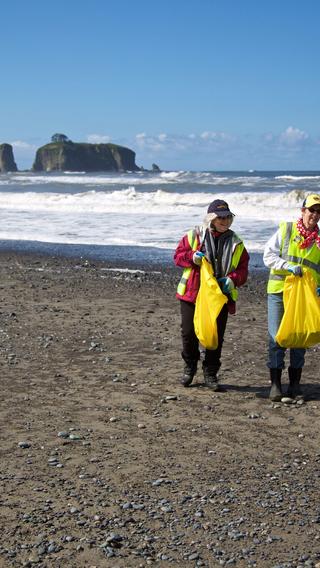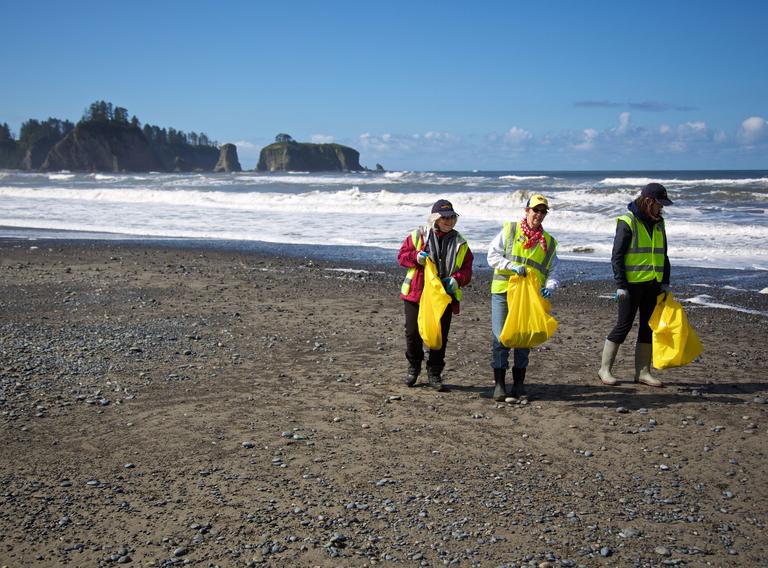The Saratoga Springs Lions Club is one of the most robust in the state of New York with 110 members and a full slate of projects, and one of its newest and most active members is a 56-year-old former college football player with a Jersey accent by the name of Tony Catalano. He’s from upstate originally but returned to the area a few years ago after years in the New York City area working in publishing sales in Manhattan and raising a family in the New Jersey suburbs.
“Tony is a force, a true leader,” says District Governor John McDonald, a Saratoga Springs Lion. “He’s likable, personable and already incredibly committed to the club. I see him moving on to greater things, for sure.”
But it wasn’t too long ago that Catalano, a former rugged linebacker for Holy Cross College, wasn’t even entirely sure what Lions clubs did. In Jersey, he’d occasionally spot a Lions sign outside a doctor’s office or a flier about an eyeglasses collection drive. But he never gave it much thought. In retrospect, that’s odd because vision problems run in the Catalano family. Catalano’s parents both had cataracts removed. Catalano himself has worn glasses since the first grade, and, in his early 30s he underwent a cornea transplant because of keratoconus, a progressive eye disease that thins the cornea.
Bad eyes were also passed down to Catalano’s daughter, Martel. When she was 13, she began to notice she couldn’t see well in the dark. After several trips to eye doctors, it was determined that Martel suffered from retinitis pigmentosa, commonly called RP. This rare genetic disease causes the gradual diminishing of the rods in one’s eyes. It starts with night blindness. Over time, peripheral vision becomes impaired. Often, the end result is legal blindness, though it can take years or even decades to reach that point.
Martel is now 28, and her RP has indeed gotten progressively worse. She and her family have come to grips with her condition in different ways. It has been difficult. For a long time, Catalano, an otherwise voluble, gregarious person, largely tried to avoid conversations about what RP meant for Martel’s future.
“Through her teenage years, we all tried to some degree to ignore her situation,” Catalano says.
“He’s a tough guy with an emotional core,” Martel says of her father. “And he had kind of a wall up about my condition. He just didn’t want to talk about it.”
That wall began to crack a little in 2016, around the time Catalano passed a Lions tent at a walk-and-run event in Saratoga. He struck up a conversation with the Lion manning the booth and saw the connection between their mission and his daughter’s plight. More to the point, he saw an avenue through which he could begin to process what was happening with Martel.
“That day really helped crystallize things for me,” Catalano says.
Fear and Sadness
In much the same way that it’s counterintuitive that someone as talkative as Catalano would resist talking about his daughter’s challenges, it’s hard to imagine Martel as a troubled young person. Today, she’s a yoga instructor and life coach living in downtown Saratoga Springs. She’s empathetic, thoughtful, easy to talk to and appreciative of friends and family and nature. She’s centered, as they say in yoga.
It’s difficult for parents to admit there’s something going wrong with their child. I think it took not only me to come to terms with everything, but also for my parents to accept that.
But Martel spent years struggling emotionally with the physical effects of RP. There was sadness and fear about the disease, of course, but also other problems, like eating disorders and bad relationships. With the benefit of hindsight, she sees it all as interconnected.
“I broke things that I would be able to fix, so that I didn’t have to think about the one I couldn’t—going blind,” she says. “I spent a decade in an exhausting marathon of depression, anxiety, physical and psychological ailments. They undoubtedly fed off of each other. When one would get bad, so would the rest—a vicious cycle of mind-body stress. I blinded myself from the fear of going blind.”
Then there were the more obvious logistical problems related to gradually going blind at such a young age. After graduating from Skidmore College in Saratoga Springs, she moved around, first to Burlington, Vermont, then back to New York City, where she worked in marketing for a nonprofit. Commuting in the city began to pose several obstacles for Martel as her peripheral vision worsened. She would accidentally step on dogs or plow into a toddler while walking in the city, resulting in embarrassing moments and injuries.
“I was coming home a mess every day after work, after living in a place of such constant tension,” Martel says. “I would come home and tell my parents, ‘I hate my job, I hate my job, I hate the city.’ But we weren’t putting together the reasons why. It was because my RP was getting worse. But that process of realization was very slow and gradual.”
Helping that process along was her mother, Corinne, a psychologist who has worked with autistic children and their families.
“My mom would facilitate these conversations—lots of late nights and dinners—where, I think we all together started to accept what was happening,” Martel says. “But my dad had no experience in family well-being or psychology. It’s difficult for parents to admit there’s something going wrong with their child. I think it took not only me to come to terms with everything, but also for my parents to accept that.”
Yoga helped with managing the stress. So did moving back to Saratoga Springs, where Tony and Corinne now live, and where less everyday variables existed. Martel now lives with her boyfriend on Main Street in Saratoga Springs. She is within walking distance of everything she needs: the gym, restaurants, groceries, the yoga studio where she’s an instructor, the tea shop where she works a few days a week. She still sees well enough to bike occasionally. When she needs to travel somewhere, her boyfriend drives, or her parents come pick her up.
Martel is also in the process of creating, with a friend, Beyond My Battle, a nonprofit online community that will offer emotional support, resources and education for people living with incurable illnesses.
“People with RP usually don’t end up with a total blackout. They maintain a few degrees of vision in the center area, but often it’s that they become legally blind,” she says. “A lot of people have sight dogs or white canes, and I anticipate that will one day happen for me. But I feel lucky so far. I’m almost 30, and my doctor thinks right now that things will go slowly for me. It’s manageable for now. But it’s going to get worse, and I’m anticipating all that.”
A New Role
At that walk-and-run event back in 2016, Catalano had been advised to contact McDonald for more information about the Saratoga Lions. He promptly did. The two hit it off: It turned out that McDonald’s uncle had been Catalano’s basketball coach back in high school. Catalano attended three meetings as a guest, and soon he was a member.
Catalano dove right in. He now serves on the board of directors and is the official Lion tamer, greeting the crowd at the weekly meetings. Among the events he’s gravitated toward are the Lions’ annual Memorial Day Duathlon, a run-bike race that attracts both locals and some premier athletes, and Camp Abilities, a weeklong camp for visually challenged children held at Skidmore College.
“At Camp Abilities, I find I get a lot out of that spiritually—hope and patience,” Catalano says. “I’m working there with people with worse vision than Martel. Working with others who are on the path to blindness has made me more comfortable talking about it, in a way. I have always felt guilt that hers is an inherited disease. It came along through my side of the family. That guilt is just something I have to deal with, I guess. But being involved [with the Lions] is helping me get through that.”
Nobody was as surprised as Martel to learn about Catalano’s enthusiasm for the Saratoga Lions Club.
“He’s never really been a volunteering type of person, and if he had, it was always coaching sports, because he’s, like, a jock,” Martel laughs. “Football is kind of the only extracurricular thing he’d ever been involved with when I was growing up.”
Like Catalano, she didn’t know much at first about the Lions or their focus on vision.
“I thought it was cool that he was volunteering, because I value that personally,” she says. “Then he started spending more time with this club, and finally I was like, ‘Why are you so involved with this club all of a sudden?’ And then he sort of told me they had a focus on blindness. And that really touched me. It was really nice to hear that.”
The club has also expanded Catalano’s horizons beyond his initial interest of helping those with vision problems. He speaks with excitement about upcoming plans to volunteer on Lions’ efforts related to hearing loss and diabetes. He’s gone full Lion—a total convert.
“So far, I feel like the club has helped me more than I’ve helped the club, though I’m hoping that changes over time,” Catalano says. “And I think she [Martel] knows that I’m doing this because of her. It’s a way for me to say ‘I love you’ without saying it— although I say that a lot, too.”



